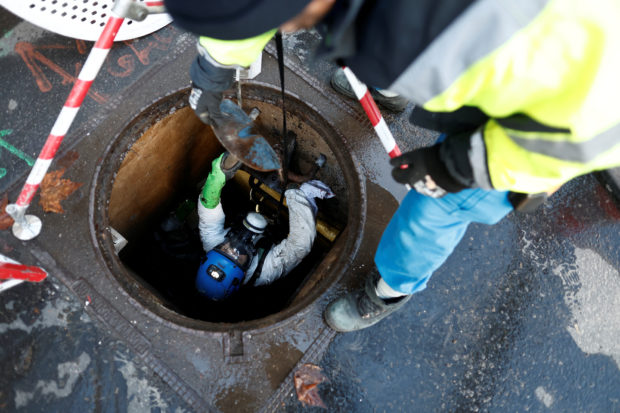Too tough to retire later: Paris sewer cleaners reject pension reform

A worker climbs out of a sewer pipe after intervention work in Paris’ sewage system, France, January 11, 2023. REUTERS/Benoit Tessier
PARIS — Guillaume Konrad’s job is to carry out and supervise emergency cleaning and repair work on Paris’ sprawling sewage system. He loves it. But it’s tough and takes its toll. And the 38-year old is not OK with the government’s new plan to make him work longer.
Because the work is so taxing – often crouching in dark, ancient, narrow, rat-infested tunnels – under current rules Konrad’s team now retire at 52, if they had enough years on the job. But because as a supervisor he does not go down as often as his team his retirement age, like for most French, is 62. Being told now he will have to work two more years, according to pension reform plans announced on Tuesday, simply seems too much.
“It’s a dangerous job in a hostile environment, where you risk falling, contamination, getting injured, you’re in contact with viruses, bacteria, toxic products. All that carries a risk for our health,” he said.
Prime Minister Elisabeth Borne said on Tuesday that the retirement age will be progressively increased to 64, and starting from 2027 one will need to have worked 43 years to get a full pension.
The government says this is necessary to balance the accounts.
Article continues after this advertisementTrade unions reject the argument and vow a tough fight on the streets to block the reform, which still needs parliament’s approval.
Article continues after this advertisementKonrad will be among those who take to the streets in a nationwide day of strikes on Jan.19.
So will 53-year-old Stephane Rouanoux, who has worked in Paris’ 24/7 emergency sewage repair team for 25 years, most of that without a protective mask, which is required now.
“Adding two years is very hard to take, with all we go through,” said Rouanoux, an army veteran who joined Paris sewage cleaner team when he returned to civilian life and still needs to put on more years to retire.
“We often need to crouch … to clean out blockages of fecal matter and grease,” he said.
Rouanoux said the reform plans made him and his colleagues angry and they would march against it.
The key question, for the government and for unions, will be how many join them.
One of the quirks of the French pension system, and one that Macron’s reform will not change, is that depending on who they work for and in which city, some sewer workers in France benefit from early retirement while others do not.
So while Rouanoux can retire early, Konrad cannot, even though he still goes down in the sewing system three to four times a week. Both find it absurd.